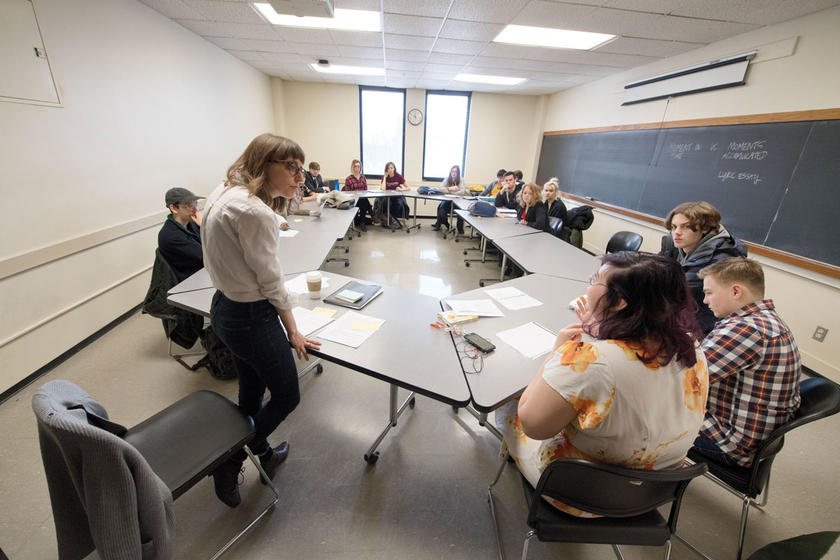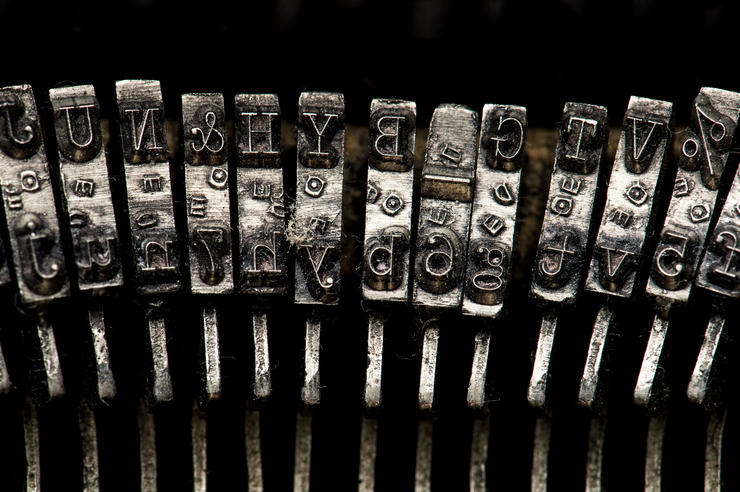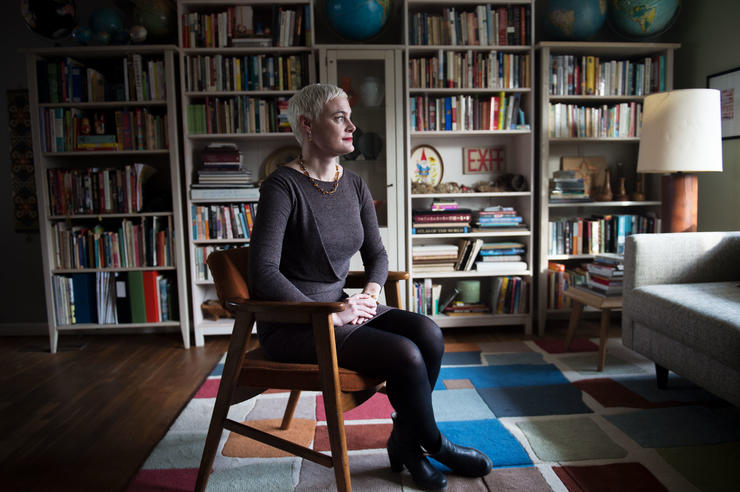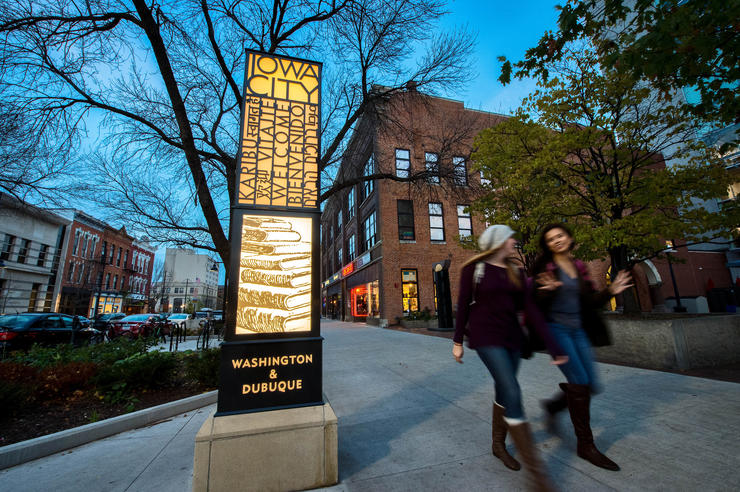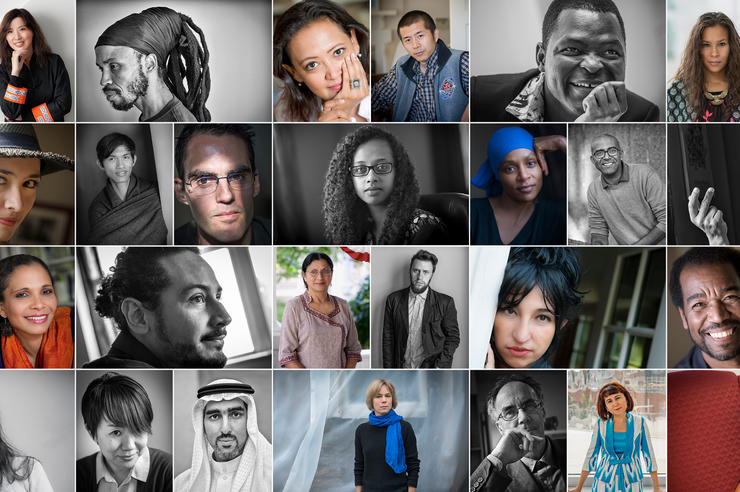Iowa: Shaping literature’s landscape for more than a century

It began in the late 19th century with literary societies and writing clubs. Before creative writing was taught at the University of Iowa, students took it upon themselves to gather, recite poetry, discuss their craft, and lay the foundation for a program that would one day become world renowned for the strength of its teaching and the quality of writers it turns out.
Since those informal beginnings, the craft of writing has become deeply ingrained in the UI, Iowa City, and the state of Iowa. Writers working in a multitude of genres enroll at the university to learn from award-winning faculty, hone their skills, and craft some of their most important and influential works.
UI writing programs claim U.S. poets laureate and winners of the Pulitzer Prize, the National Book Award, MacArthur Foundation fellowships—as well as other major honors—among their alumni and faculty.
The University of Iowa’s first creating writing class, “Verse-Making,” is taught by George Cram Cook, who would later found the Provincetown Players, the first modern American theater company.
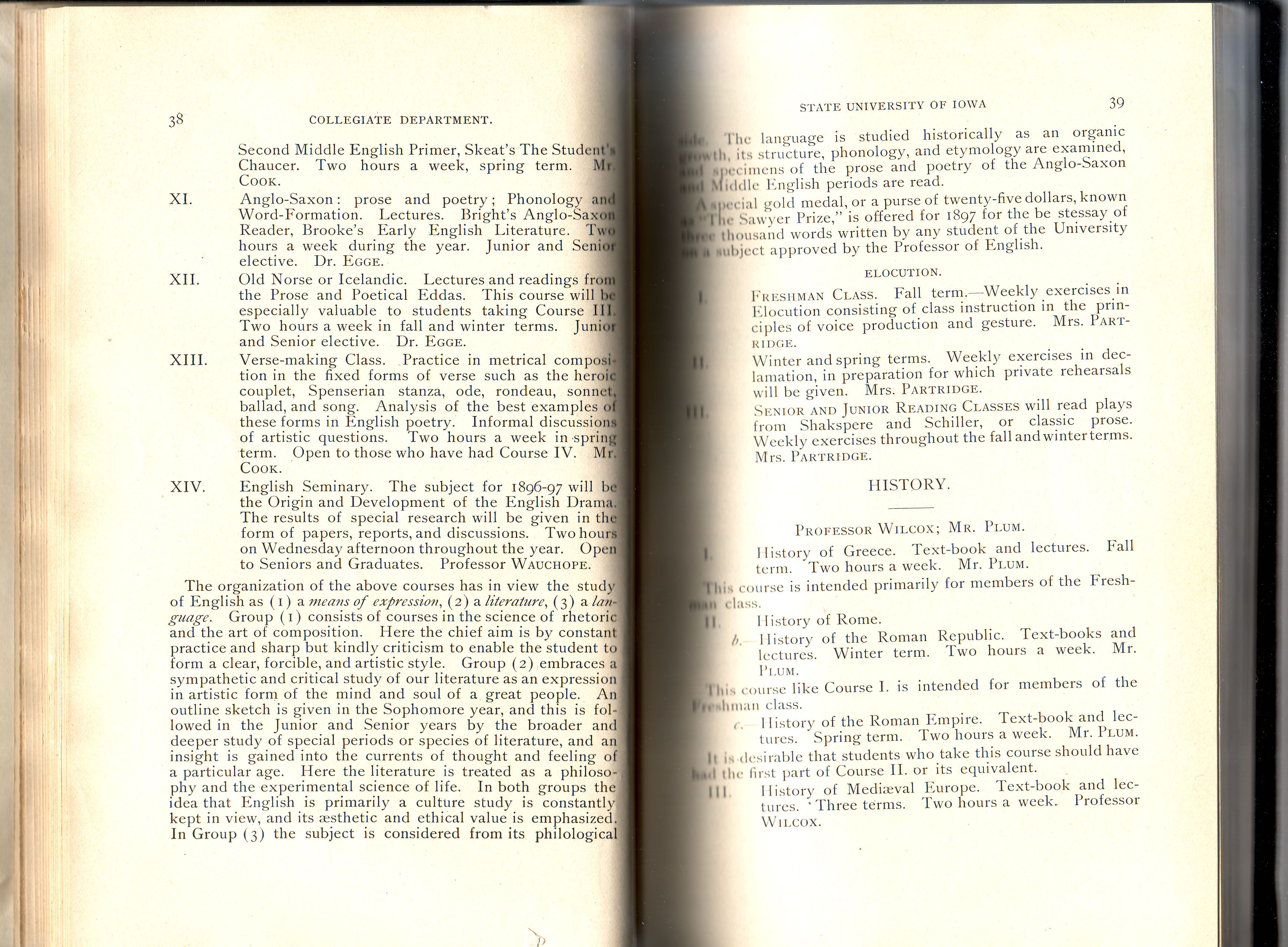
The Daily Iowan student newspaper first goes to press at the University of Iowa. The Daily Iowan came from a merger of two campus publications, The Vidette-Reporter and The State University of Iowa Quill. The Vidette-Reporter also was the product of a merger of The Vidette and The University Reporter. The latter was founded in 1868.
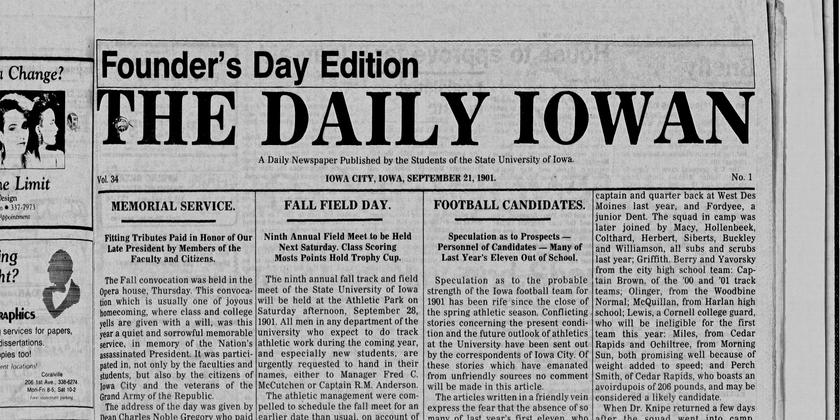
A new approach to writing pedagogy emerges: the writing workshop. In these new workshops, a senior writer leads a discussion about a work written by another member of the class; the other students in the workshop share impressions, advice, and analysis. As Paul Engle, former director of the Iowa Writers’ Workshop and founder of the International Writing Program, observed, “The students benefited greatly from hearing a variety of attitudes toward their work. It was like publishing, then being reviewed.”
The University of Iowa establishes a BA in journalism. While newspaper publishers and editors are skeptical that the art of journalism can be taught in a classroom, the number of students interested in journalism classes increases. The School of Journalism is established in 1924 and housed in the former Close Hall at the intersection of Dubuque Street and Iowa Avenue.
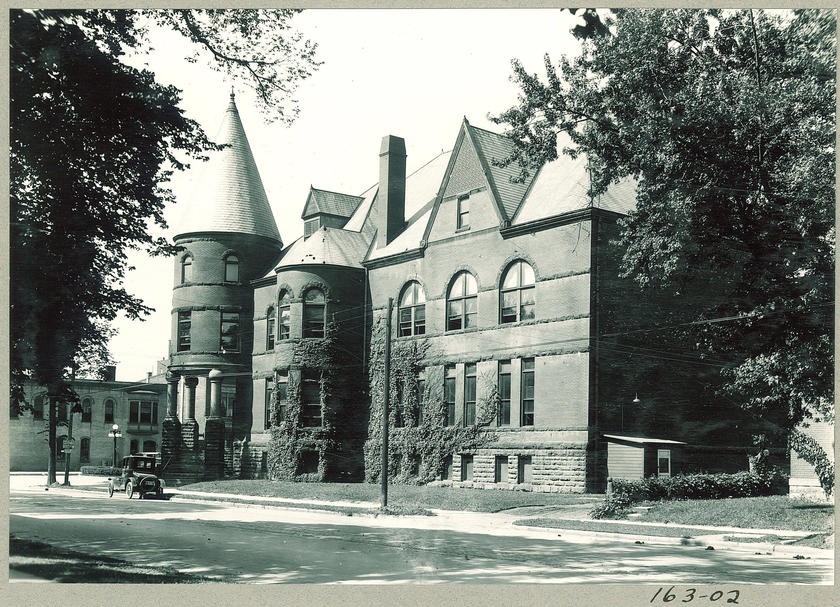
Carl Seashore, dean of the Graduate College, introduces a new model for the academic study of the arts, announcing that the University of Iowa will be the first university in the U.S. to accept creative work as theses for advanced degrees.
The University of Iowa Department of English begins to offer courses such as “Essay Writing” and “Advanced Composition.”
The Iowa Writers’ Workshop is formally established with the gathering of poets and fiction writers under the guidance of founding director Wilbur Schramm. “It seemed like an idea whose time had come,” Schramm said. The Writers’ Workshop has become one of the world’s most distinguished creative writing programs, with faculty, alumni, and visitors including Robert Frost, Dylan Thomas, Rita Dove, Robert Lowell, Kurt Vonnegut, Raymond Carver, Flannery O’Conner, John Irving, and Joy Williams.
Poet Paul Engle, one of the first students to receive an MA in creative writing from the University of Iowa, assumes the directorship of the Writers’ Workshop. Under Engle’s leadership, the Workshop flourishes. Engle actively recruits students from across the country and around the world. During World War II, enrollment is no more than a dozen students, but after the war it grows to more than 100, and the program is divided into the fiction and poetry sections that exist today. The Workshop’s prominence continues through the directorships of George Starbuck (1966–69), John Leggett (1970–1987), Frank Conroy (1987–2005), and Lan Samantha Chang (2006–present).
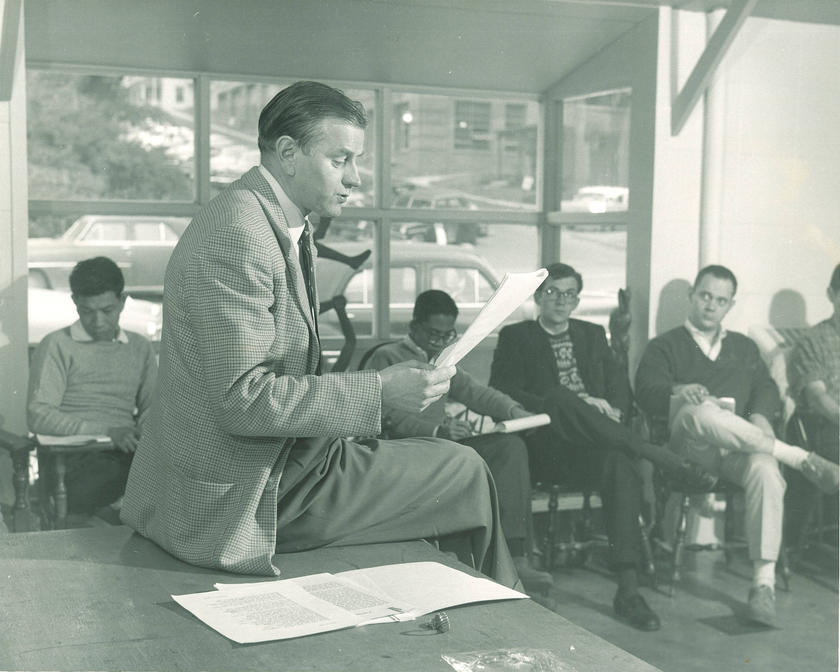
Kim Merker, a former Workshop student, founds the Stonewall Press and later the Windhover Press, which will publish work of poets like James Tate, Philip Levine, and W.S. Merwin and establish the University of Iowa in the world of fine press printing.
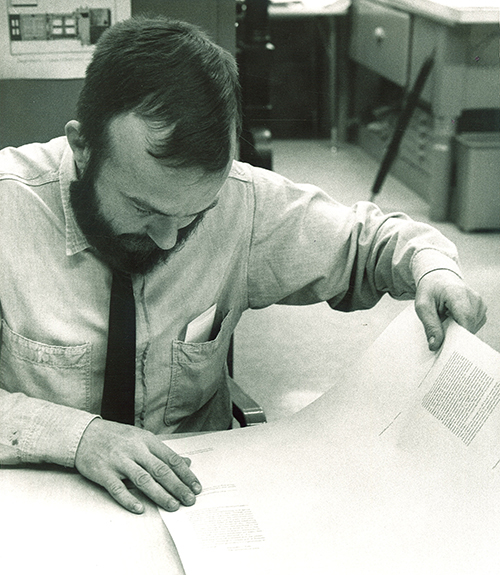
Paul Engle, in concert with Esquire, orchestrates a symposium at the University of Iowa titled “The Writer in Mass Culture” that brings Norman Mailer, Ralph Ellison, Mark Harris, and others and is covered in Newsweek.
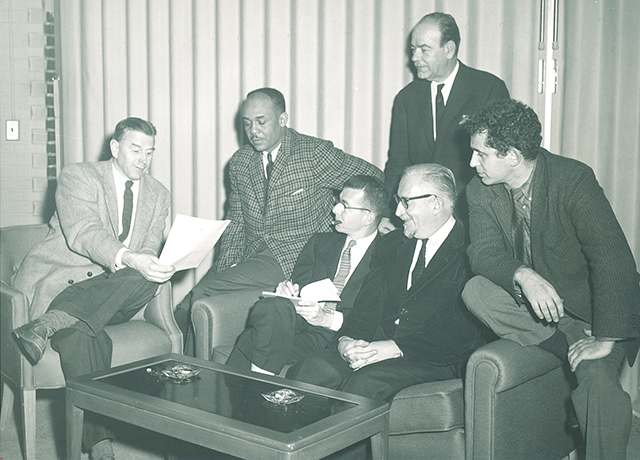
The Writers’ Workshop offers the country’s first translation workshop. Paul Engle and his wife, Hualing Nieh Engle, pioneer a “tandem method” in which the author and translator co-author the translated work. This later leads to the development of the UI’s MFA program in literary translation.
Carl Klaus and Richard “Jix” Lloyd-Jones, who later helps shape the Nonfiction Writing Program, teaches the first courses on expository writing
The Writers’ Workshop moves from temporary military barracks-style buildings near the Iowa River, where the Iowa Memorial Union now stands, to the English-Philosophy Building.
Paul and Hualing Nieh Engle found the International Writing Program, a writing residency program for students from around the world. Since its founding, the IWP has hosted more than 1,400 writers from more than 150 countries. While the IWP conducts classes and tours throughout the year, its principal program is its fall residency, which is designed for established and emerging creative writers—poets, fiction writers, dramatists, and nonfiction writers. The residency provides writers with time to produce literary work, as well as the opportunity to participate in American literary, academic, and cultural life. The Engles co-direct the IWP until 1977, after which Paul retires and Hualing continues as director. She retires in 1988 and the position is then held by Fredrick Woodard (1988–1990), Clark Blaise (1990–1998), Steven Ungar (interim, 1998), Sandra Barkan (interim, 1999), and Christopher Merrill (2000–present)
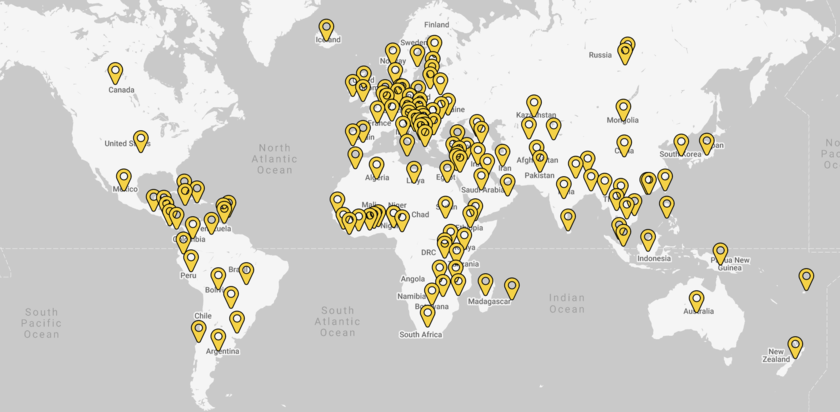
The University of Iowa Press is established to publish poetry, short fiction, short creative nonfiction, and books that fill the needs of scholars and students throughout the world. The press also publishes the winners of the Iowa Short Fiction Award and Iowa Poetry Prize, poetry anthologies, letters and diaries, biographies, memoirs, and regional history.
Faculty, staff, and students from the varied literature programs at the UI found the Iowa Review, which publishes fiction, creative nonfiction, translations, photography, and work in emerging forms by established and emerging writers. The Iowa Review publishes three issues per year, and work in the journal has been selected to appear in anthologies such as Best American Essays, Best American Short Stories, Best American Poetry, and The O. Henry Prize Stories.
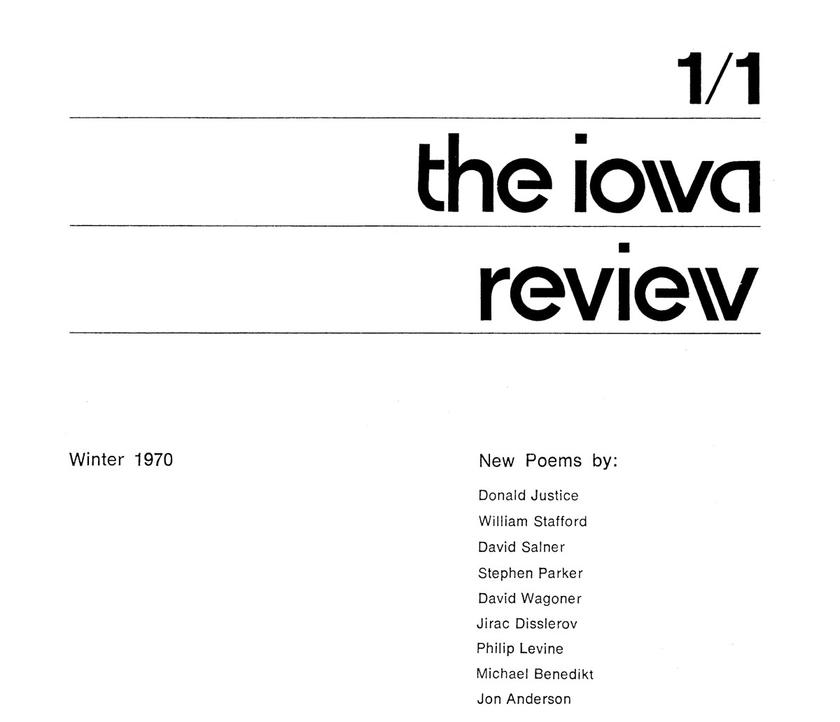
The Playwrights Workshop is founded by Oscar Brownstein as he reshapes the existing playwriting MFA into a workshop for new play development. Based on a strong tradition in playwriting that has existed at the UI since the 1920s, the MFA in playwriting is an intensive three-year program that educates and trains talented playwrights and collaborative theater artists who will lead the world in the creation of new works. Brownstein would go on to create the Iowa New Play Festival, a central tenant of the program today, in which plays receive staged readings and productions in front of guest artists who respond to the work.
Paul and Hualing Nieh Engle are nominated for the Nobel Peace Prize for their work fostering the exchange of creative and cultural insights through the International Writing Program. More than 300 writers from around the world advance the Engles for the prize, although the Nobel committee decides none of the year’s nominations meet the criteria for the award.
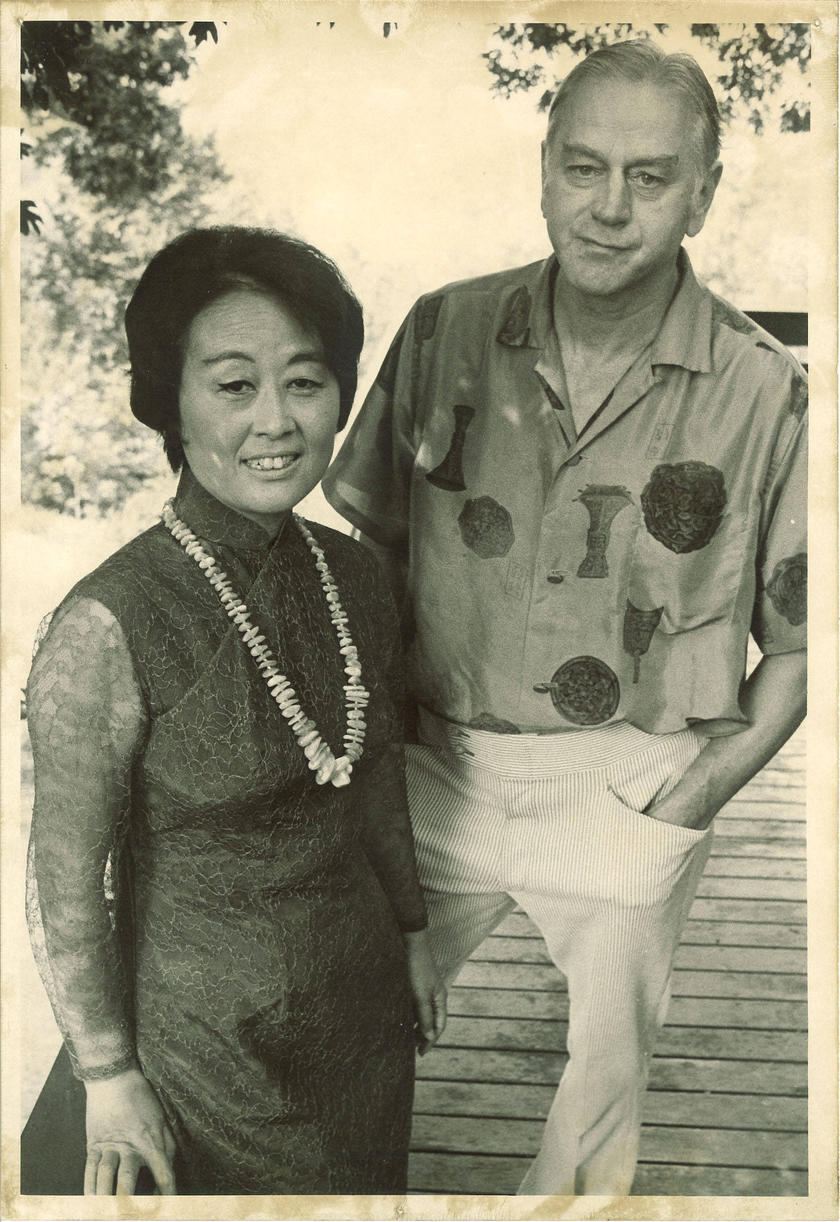
The Department of English approves a new master’s degree, an MA in English with emphasis in expository writing. From the proposal by Carl Klaus, chair of the Committee on Advanced Composition: “We propose an M.A. in English which will emphasize the theory, analysis, practice, and teaching of expository writing. Like other English departments, ours has always recognized the function of a particular kind of exposition—the essay in literary criticism…Student interest in expository courses, both at the undergraduate and graduate levels, has increased so rapidly in the past few years…it seems clear that expository writing is becoming an important academic subject—that academically trained practitioners and teachers of writing are and will be increasingly in demand.”
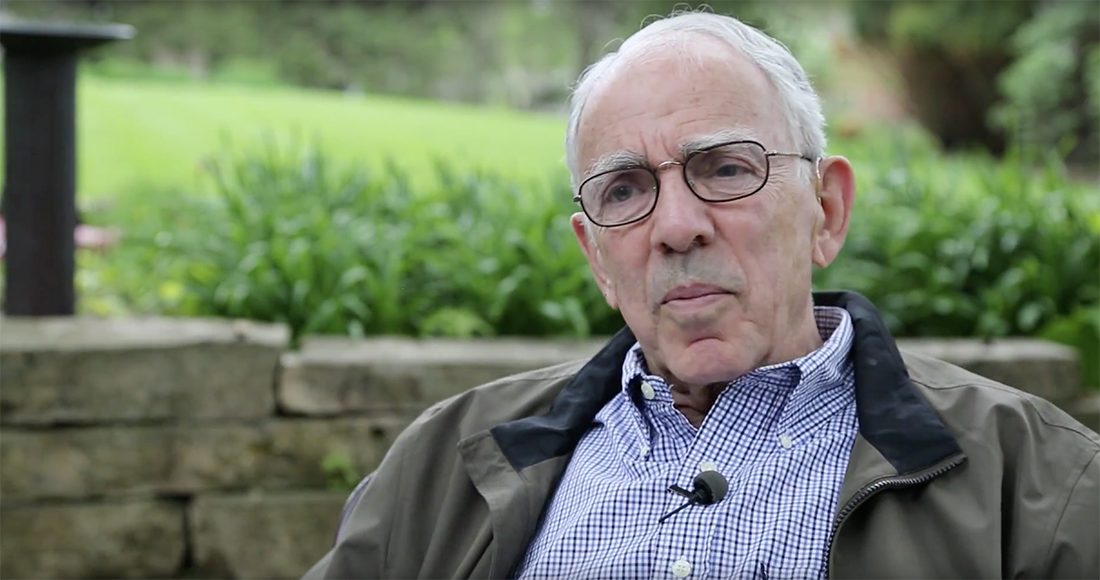
After China’s 1978 reforms, the International Writing Program organizes the “Chinese Weekend” on Sept. 15 and 16, 1979. The event brings together writers from China, Taiwan, and the United States for a weekend of literary discussions at the International Writing Program. The gathering is unprecedented in the history of literary relations between the United States and China.
Dramatic social and cultural changes are affecting the study and practice of nonfiction literary writing. Second-wave feminism encourages women to explore, document, and express new realizations about their lives. Memoir becomes fashionable, and writers are encouraged to consider their own life’s stories. For this reason, and because of faculty interest in the form, the main emphasis of the nonfiction writing program shifts to the personal essay, remaining so to this day. Teachers focus on sensitivity to voice, creation of persona, management of style, and awareness of the audience.
The Center for the Book is founded by Kim Merker as an innovative, interdisciplinary research and arts unit that combines training in the techniques and artistry of bookmaking with research into the history and culture of books. The center offers perhaps the widest range of book arts courses in the U.S., including letterpress printing, bookbinding, papermaking, and historical and arts-based calligraphy.
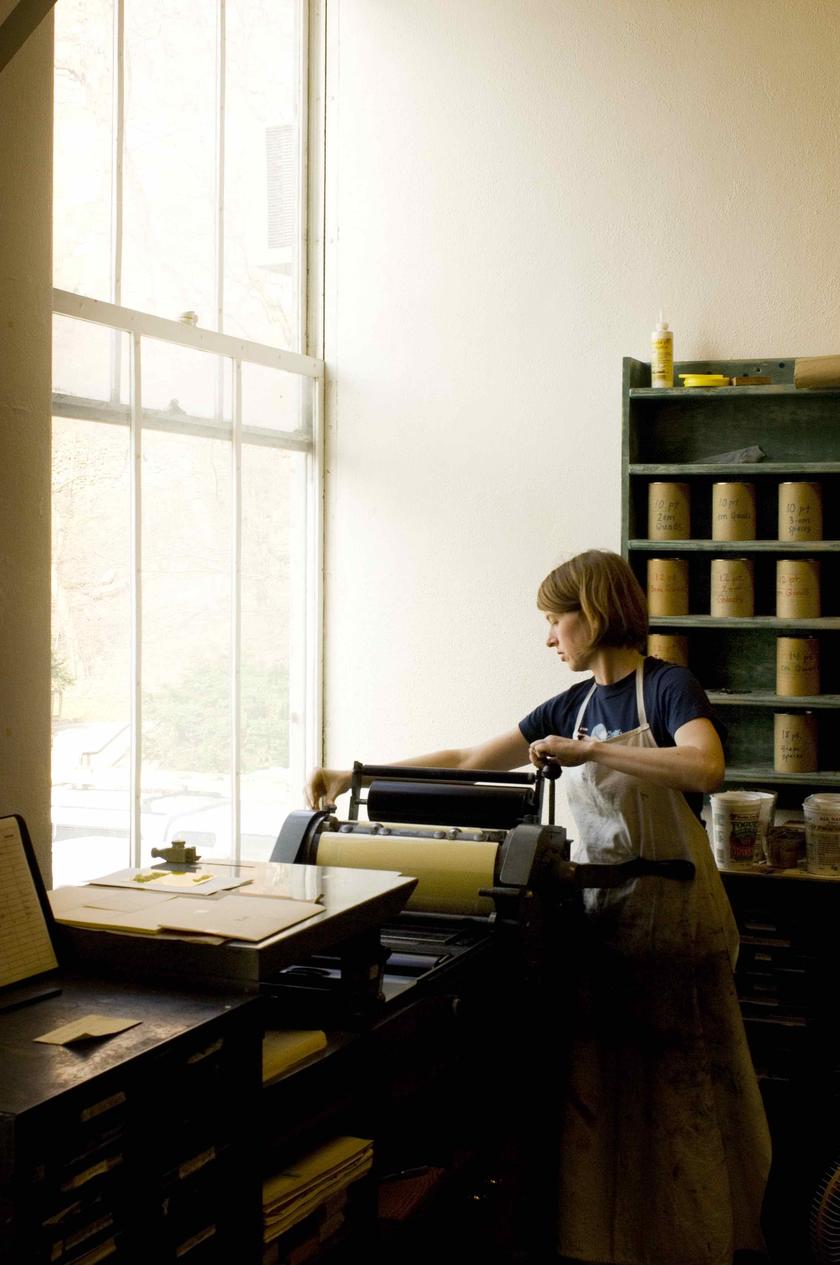
The Iowa Summer Writing Festival is founded. Each summer, it accepts adult students from across the country for intensive weeklong and weekend workshops.
The Nonfiction Writing Program acquires a national reputation for being a highly selective and gifted community of writers. Its uniqueness stems in part from its unusual history. Unlike most other writing programs, it is founded by scholar-writers trained as literary critics, rhetoricians, and theorists of style. Their influence on the character and philosophy of the program helps shape the curriculum and ensure that later faculty members—those specifically recruited to be, in effect, “writers-in-residence”—continue the commitment to a rigorous and well-planned curriculum and a thoughtfully designed pedagogy. The new generation of faculty includes essayists Patricia Foster, Robin Hemley, and John D’Agata. Earlier faculty, including Paul Diehl, David Hamilton, Brooks Landon, and Susan Lohafer, continue to teach signature courses, rounding out a balanced and varied faculty in a program reaching its maturity.
Because “MA in English with Emphasis in Expository Writing” no longer describes what is studied in the classroom and may deter the kind of students for whom the program is designed, faculty propose changing it to an MA in nonfiction writing.
Faculty member Paul Diehl requests changing the MA in nonfiction writing to an MFA in nonfiction writing. The program has developed into the form and mission it carries today: to train and nurture talented writers of literary nonfiction. From the request written by Paul Diehl: “The department views this change as necessary for two reasons. First, the program now is clearly rooted in the fine art of literary nonfiction, an increasingly important genre to the writing community…Second, and more importantly, graduates of the program have found themselves disadvantaged when applying for college-level teaching positions in the area of nonfiction. Even though one of our graduates may have far more experience in nonfiction, she often finds herself losing out to a candidate less qualified but holding an M.F.A. in poetry or fiction; in other words, she loses out to someone presenting the ‘terminal’ degree in the writing arts.”
The Writers’ Workshop moves into its current administrative home, the Dey House, a historic, Victorian-era home adapted for reuse as an academic building. In 2006, an addition is built: the Glenn Schaeffer Library and Archives, which features a library and reading room, classrooms, and faculty offices.
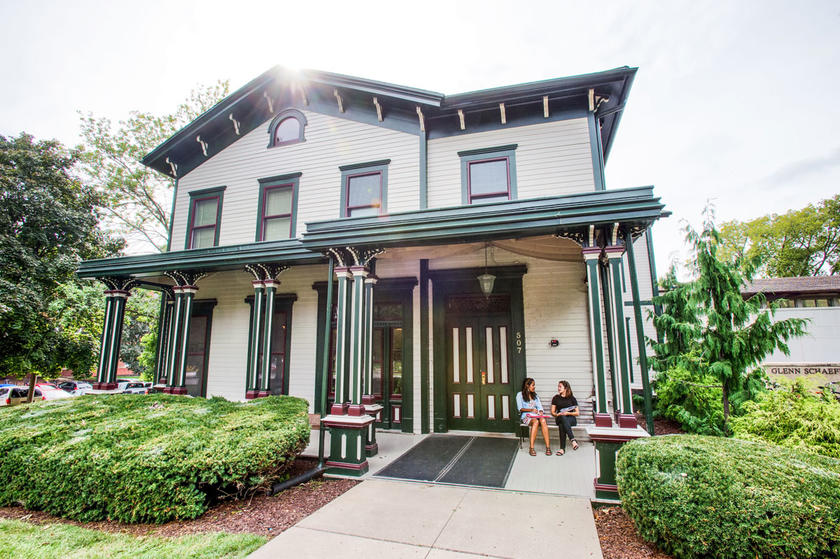
After an unsuccessful director search, the university announces that the International Writing Program will be put on a one-year hiatus and reconfigured. After months of public outcry, the program is returned to its original format. Christopher Merrill is named director in 2000.
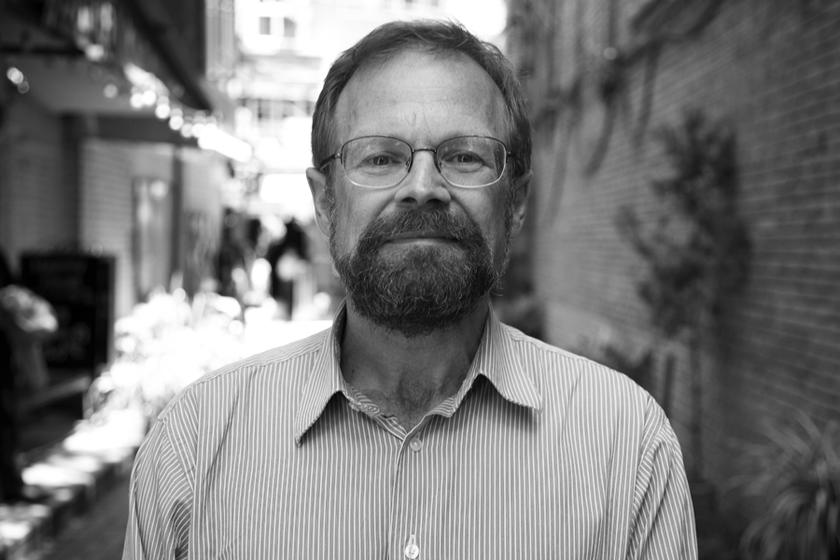
The International Writing Program broadens its programming overseas, hosting symposiums, readings, and lectures around the world.
The Carver College of Medicine Writing and Humanities Program begins, offering medical students elective courses in literature and writing along with the chance to explore the connections between the humanities and medicine through the Humanities Distinction Track. The staff also offer consultations to review any form of writing, including creative writing, scholarship personal statements, CVs, research papers, abstracts, et cetera.
The International Writing Program moves from its old home in the English-Philosophy Building into Shambaugh House, which was moved from 219 N. Clinton St. to 430 N. Clinton St. the year before.
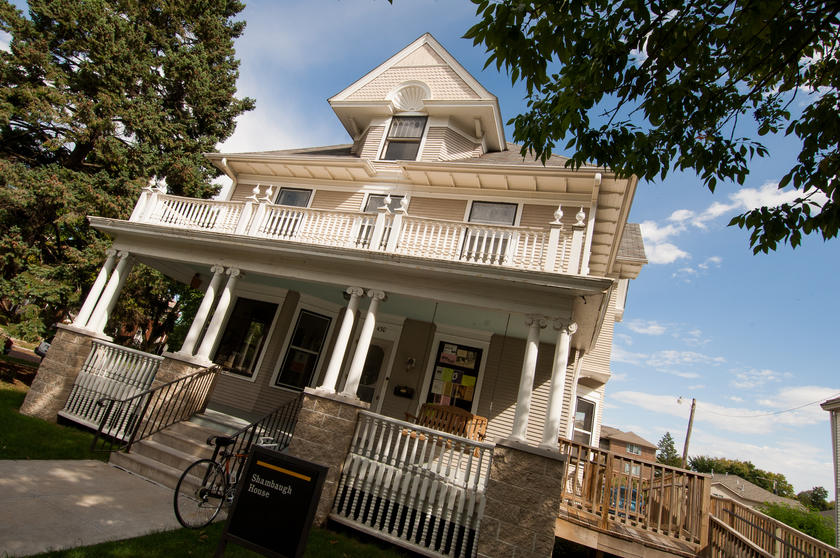
The first annual Examined Life Conference is held, exploring intersections of the arts and medicine. The first Examined Life Journal is published in 2011, focusing on works related to health and the human condition in all its myriad definitions.
The International Writing Program and Young Writers’ Studio begin Between the Lines, which hosts international students age 16–19 for two weeks of writing seminars, workshops, and cultural events in Iowa City.
The United Nations Educational, Scientific and Cultural Organization (UNESCO) designates Iowa City, Iowa, the country’s first and world’s third City of Literature. International Writing Program Director Christopher Merrill leads the UI Writing University committee that submits the city’s proposal. The UI and its writing programs continue to be involved in Iowa City UNESCO City of Literature programs and events, including the annual weeklong Iowa City Book Festival.
The UI offers an MFA in Spanish creative writing. The program—one of only three Spanish-language MFA programs in the U.S. when it begins—is conceived by decorated Chilean poet and then-UI faculty member Oscar Hahn with then-chair of the Department of Spanish and Portuguese Tom Lewis. In 2009, Lewis persuades Ana Merino to leave her faculty position at Dartmouth College to develop the program and become its director. Merino works with Lewis as well as Chilean writer and then-faculty member Roberto Ampuero, Latino writer Santiago Vaquera, and Brian Gollnick, associate professor of Latin American Literature, to create the program. They envision a program for students who want to read, learn, and write in their native Spanish, and decide the program should include both workshop and outreach components. Merino develops the Creative Literacy Project as part of the new MFA, and in the following two years, the department adds two faculty to the program: Central American writer Horacio Castellanos and Mexican writer Luis Humberto Crosthwaite, with Crosthwaite as a two-year visiting faculty member. Pictured below, clockwise from top left: Roberto Ampuero, Santiago Gamboa, Santiago Vaquera, and Ana Merino.
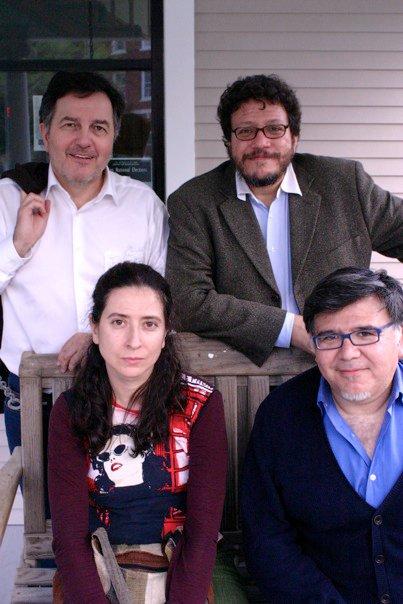
The Frank N. Magid Center for Undergraduate Writing is established. The center offers UI students the unique opportunity to enhance their academic, creative, and professional communication skills by focusing on the written word. The center is home to the Undergraduate Certificate in Writing, the Iowa Youth Writing Project, and the Iowa Young Writers’ Studio.
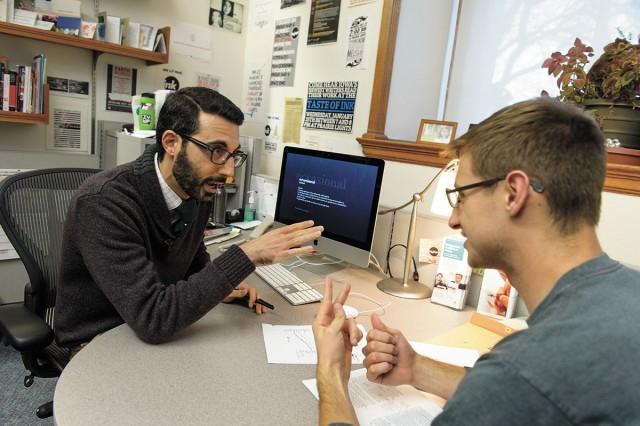
The UI adds a minor in translation and global literacy. It’s one of a small handful of such undergraduate degrees offered in the country and builds on the UI’s legacy in the field.
The UI adds English and creative writing as an undergraduate major. The major grows quickly in popularity, with 526 students declaring in the fall of 2017, making it the ninth-most frequently chosen undergraduate program on campus for first-year students.
